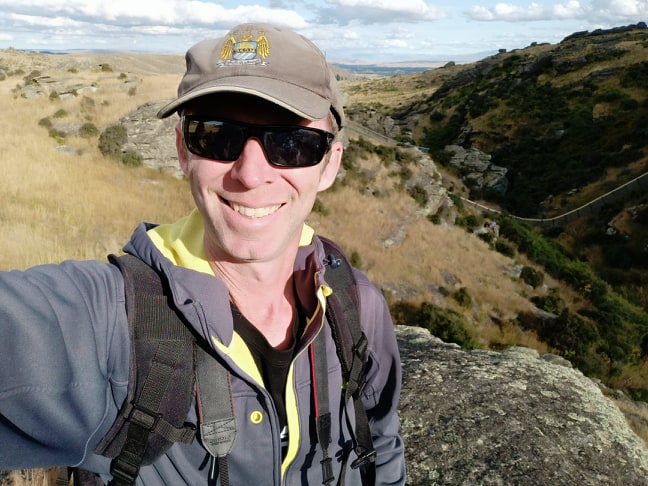Clyde School - Alistair Banks

2020 | Skink and gecko monitoring in Central Otago
School: Clyde School
Host: Manaaki Whenua - Landcare Research
Region: Clyde School
Clyde School is delighted to renew its association with the Royal Society Te Apārangi with Alistair Banks’ participation in the Science Teaching Leadership Programme (STLP) in 2020. Sally Lloyd participated in the programme in 2015. The school anticipates that Alistair and Sally will work together to enhance delivery of the New Zealand science curriculum at Clyde School.
Alistair has had 22 years teaching in the primary education sector. During this time, he has taught children from a range of cultures and backgrounds, including two years teaching in local schools in Brunei Darusalaam. He has particular strengths in teaching literacy and numeracy, and is passionate about New Zealand’s environment. Alistair is Central Otago born and bred and has a strong links to the area. He is Clyde School’s enviroschool leader and has lead them on a successful journey helping to increase native birdsong in Clyde.
During his placement with Manaaki Whenua/Landcare Research, Alistair monitored Otago and Grand Skink populations at the Mokomoko Dryland Sanctuary near Alexandra. His efforts helped establish evidence that these critically endangered skinks are breeding successfully inside the sanctuary. He also identified any new skinks sighted by others to help maintain evidence on the success of the translocation of skinks into the new sanctuary.
One of the highlights of his placement was when Alistair was involved in a Department of Conversation(DOC) expedition to the Rock and Pillar Ranges near Middlemarch to establish the impact of a recent fire in populations of the critically endangered Burgan skink. It was found that the Burgan skink was prevalent in more places than previously thought, which was a great result.
Alistair has been privileged to learn from his host, Predator Free 2050 coordinator Grant Norbury about community ‘Predator Free 2050’ initiatives around New Zealand, and the different innovative methods that are being used to support these community projects. He has enjoyed developing his leadership skills under Grant’s tutelage and looks forward to putting them into use leading the Clyde School community forward in their scientific achievements and understanding.
Alistair has enjoyed all the opportunities given to him by the STLP programme, especially enhancing his knowledge of Mātauranga Māori. He is looking forward to incorporating this new knowledge and experience into improving achievement in science at Clyde School.
Alistair would like to thank Grant Norbury and all staff at DOC’s Alexandra office for welcoming him so openly.
